East side of 7th Floor, No. 3663, North
Zhongshan Road, Shanghai, China, 200062
Tel: +86 21 6223 2322
www.smile.ecnu.edu.cn
On the afternoon of February 20, 2025, the Shanghai Municipal Institute of Lifelong Education, the Shanghai Elderly Education Curriculum Research and Evaluation Guidance Center (SERECG), and members of the “Climate Change Education Curriculum Development Consortium” attended the theme meeting of the ESD Working Group of the UNESCO Global Network of Learning Cities (UNESCO GNLC). The theme of the meeting was “Global Goals, Local Souls: The Links Between ESD and Culture”.
The conference featured keynote speeches by experts, scholars and climate change education practitioners from three learning cities - Shanghai, China, Sukhothai, Thailand, and Okayama, Japan - and representatives from GNLC member cities discussed the in-depth integration of ESD with cultural heritage and climate change.
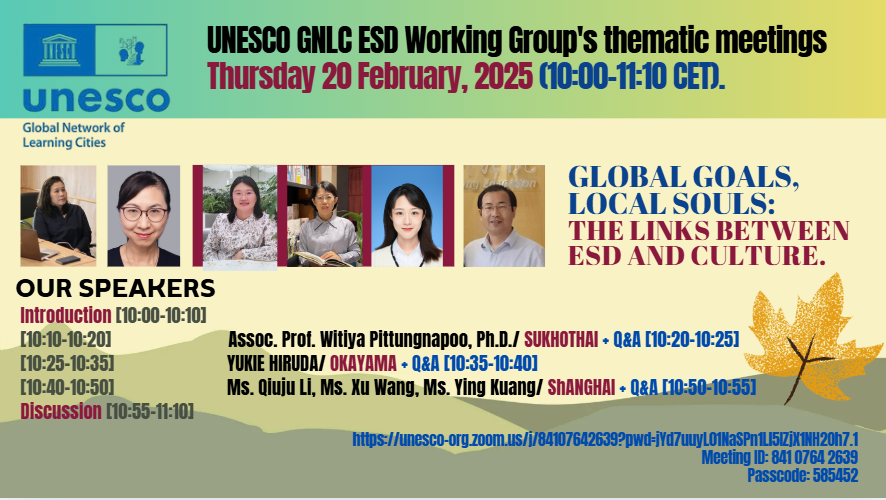
Representatives from the Shanghai Climate Change Education Curriculum Development Consortium shared Shanghai's cutting-edge exploration of intergenerational learning and innovative climate change education with the theme of “Intergenerational Climate Change Education and Cultural Sustainability: Shanghai's Innovative Practices”. Wang Xu, Director of the Teaching Department of the Jing'an District University for the Elderly and part-time researcher of the Shanghai Municipal Center for Elderly Education Curriculum Research and Evaluation, Li Qiuju, Principal of the Nanhui New Town Community School in Pudong New District and part-time researcher of the Shanghai Institute for Lifelong Education, and Kuang Ying, teacher of the Jing'an District Amateur University and part-time researcher of the Shanghai Municipal Center for Elderly Education Curriculum Research and Evaluation, respectively, introduced the innovative practices in Shanghai at different levels and in different regions. Practices.
Prof. Li Jiacheng, Executive Vice President of the ShanghaiMunicipalInstitute for Lifelong Education, project team members Zhang Lingling and Zhang Mengjie, Principal Dong Wenqian of Huaxin Town Community (Elderly) School in Chonggu Town, Qingpu District, and Teacher Huang Yuwen of Wujing Town Community (Elderly) School in Minhang District, as well as Master's Degree students Yang Yining and Yang Ziyi from the East China Normal University, participated in the meeting together.
Director Wang Xu introduced in detail the “Walking on Suzhou Creek, Creating a Green Future” Climate Change Education and Research Program of Jing'an District University for the Elderly. The program organizes intergenerational cooperative learning between senior citizens and university students and secondary school students to raise participants' awareness of climate change and environmental protection through field visits, virtual reality (VR) experience, art creation and hands-on practice. Under the guidance of university students, the elderly made simple solar water heaters and applied them in their daily lives, deeply appreciating the important role of renewable energy in addressing climate change. The middle school students paired up with the elderly to create “Suzhou Creek Impression” paintings. These works not only showed the natural beauty of Suzhou Creek, but also reflected the common hope of both generations for a better environment.
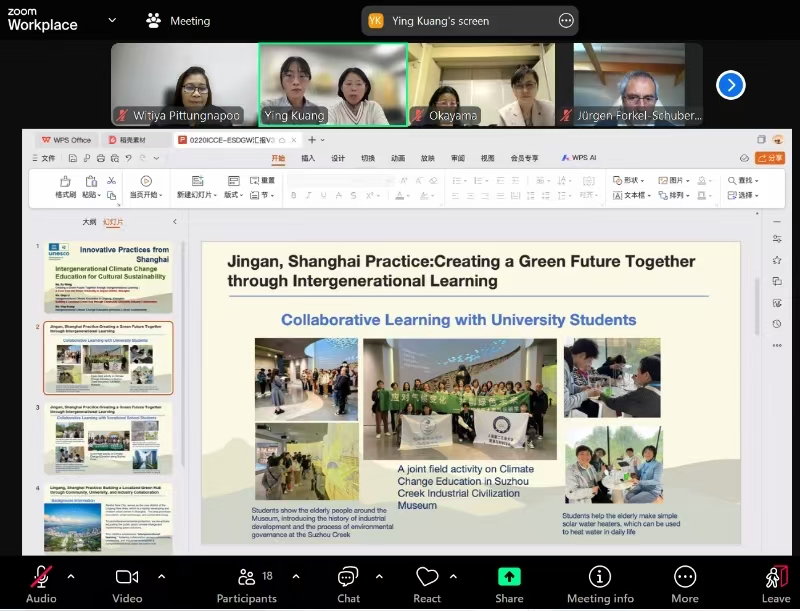
Focusing on the innovative practice of Nanhui New Town Senior University, President Li Qiuju introduced the green education base created through the cooperation of community, university and industry. With “one old, one small, one green” as the core, the project relies on the professional resources of the senior university, community schools and the Low Carbon Institute of Shanghai Jiaotong University to build an intergenerational learning platform and carry out science popularization, research and practice classes. Combining the regional characteristics of Lingang, the professional faculty of Jiao Tong University, and innovative and green low-carbon resources, the project promotes community-based climate change education through green skills training and smart experiences.
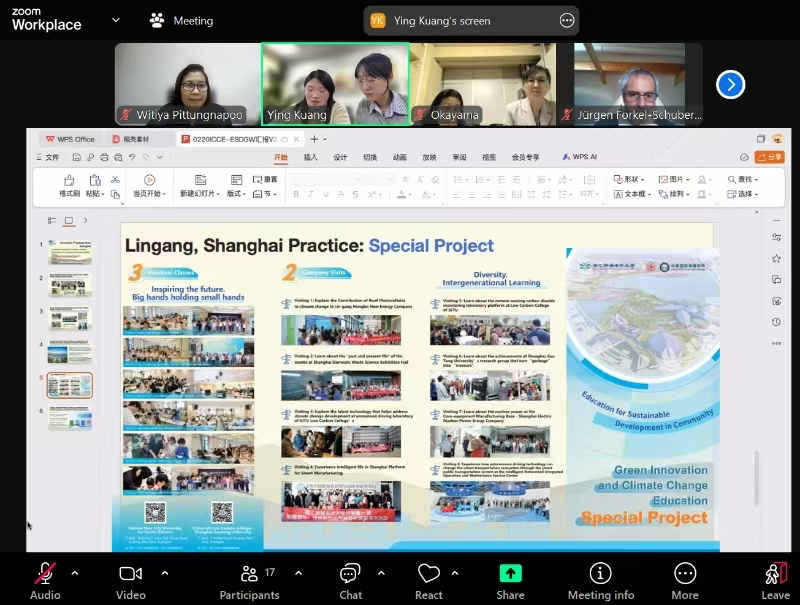
Dr. Witiya Pittungnapoo, Sukhothai, Thailand, shared practical experiences on “ESD and crafts and cultural preservation”, emphasizing the key role of universities in promoting ESD and how climate change action can be integrated with cultural heritage. Ms. Yukie Hiruda from Okayama, Japan, presented ESD actions at the community level and innovative initiatives to address climate change in Okayama City, demonstrating the unique value of the local level in promoting ESD.
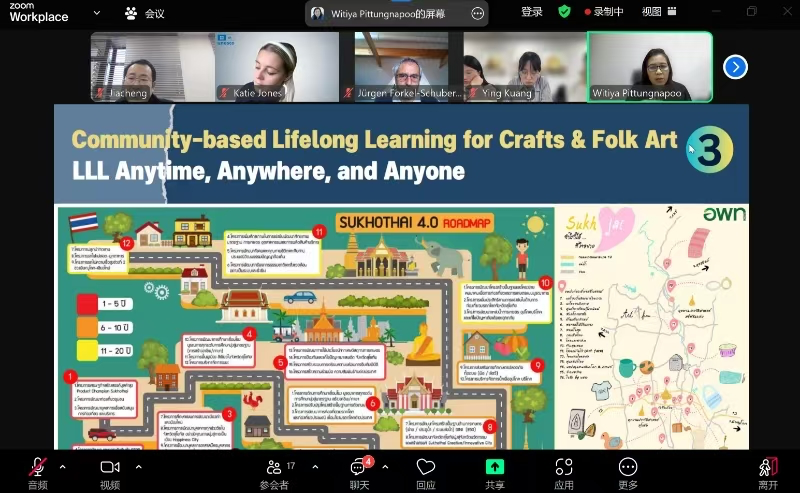
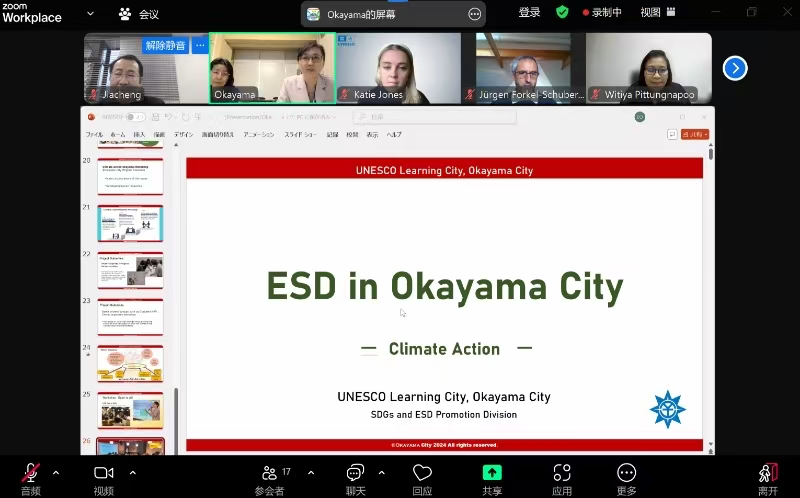
At the meeting, experts from the ESD Working Group of UNESCO's Global Network of Learning Cities held in-depth discussions on topics such as intergenerational culture and climate change education, and highly appreciated Shanghai's practical achievements. The experts believed that Shanghai's intergenerational climate change education practice not only strengthens communication and understanding between different generations, but also effectively spreads environmental awareness and fulfills education's commitment to a sustainable society, providing valuable experience and reference for the construction of global learning cities.
The success of this conference further highlights Shanghai's innovative capacity in the field of global ESD, and provides new ideas and strategies for addressing climate change and building learning cities.